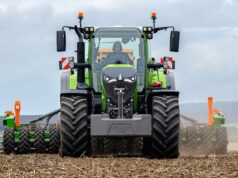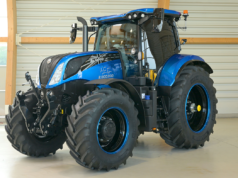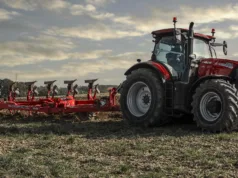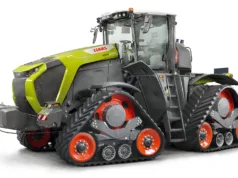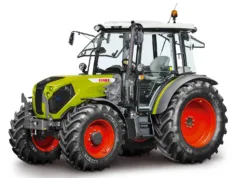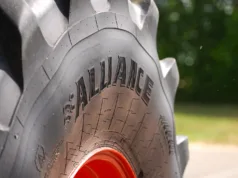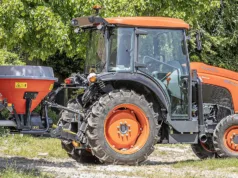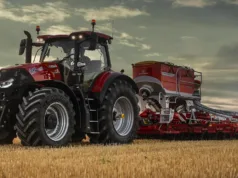New Holland has announced its strategy for meeting Stage IIIB emissions standards when they are introduced next year. From January 2011, cooled exhaust gas recirculation (CEGR) will be used in engines up to 174hp, while selective catalytic reduction (SCR) technology – which requires the use of AdBlue – will feature in larger power units. The SCR technology will then be extended to engines of 100hp or more from January 2012.
New Holland’s director of global marketing and communication, Pierre Lahutte, said the company believed that a one-size-fits-all-approach just wouldn’t work in modern farming: “We are committed to integrating the best available engine technology for every machine and operation.”
The new engines have been developed in partnership with Fiat Powertrain Technologies (FPT), which has already produced more than 100,000 Cursor and Nef engines for the truck industry that that effectively use SCR technology. Continual development of the technology has resulted in a reduction in operating and maintenance costs, while increasing productivity and meeting emission requirements at a competitive price.
While CEGR simply involves passing some exhaust gases back into the engine – along with the air and diesel – to be burnt a second time to reduce emissions, SCR is an after-treatment that’s separate from the main engine function and does not compromise horsepower or torque. It uses a catalyst that treats the nitrogen oxides contained in the exhaust gases with an odourless mixture of chemical urea and purified water – already widely available in the UK as AdBlue – transforming them into harmless water and nitrogen.
FPT exhibited a six-cylinder Nef engine at Agritechnica 2009 that featured the SCR system. The N67 ENT has a displacement of 6.7 litres, four valves/cylinder, electronic common rail injection and features oil-change intervals up to 600 hours. The engine is based on the Stage 3A N67 that is already used in combines and tractors.
 |
The 10.3-litre, 24-valve, six-cylinder Cursor 10 produces up to 428hp and has been successfully used with AdBlue in the road haulage industry for some time. |
“SCR will be further developed to guarantee our customers the most reliable, cost-effective and state-of-the-art products when future, ever-more-stringent emission regulations are introduced for the agricultural industry,” Mr Lahutte added. “By using SCR technology beginning in 2011, New Holland has invested in research and development now that will be invaluable in helping us to achieve final Stage 4 requirements.
“Having compliant technology now allows us to keep our research investments focused on developing the next generation of agricultural machinery that will redefine the efficiency, comfort and performance that farmers demand.”
New Holland has been pioneering the use of biodiesel in agricultural machinery since 2006 and is currently researching the most advanced technologies. The brand developed the award winning NH2 tractor – the first to use hydrogen fuel cells – and the Energy Independent Farm concept, exploring ways to enable farmers to reach zero emissions and energy independence in the future.
For more information visit: www.newholland.com.


